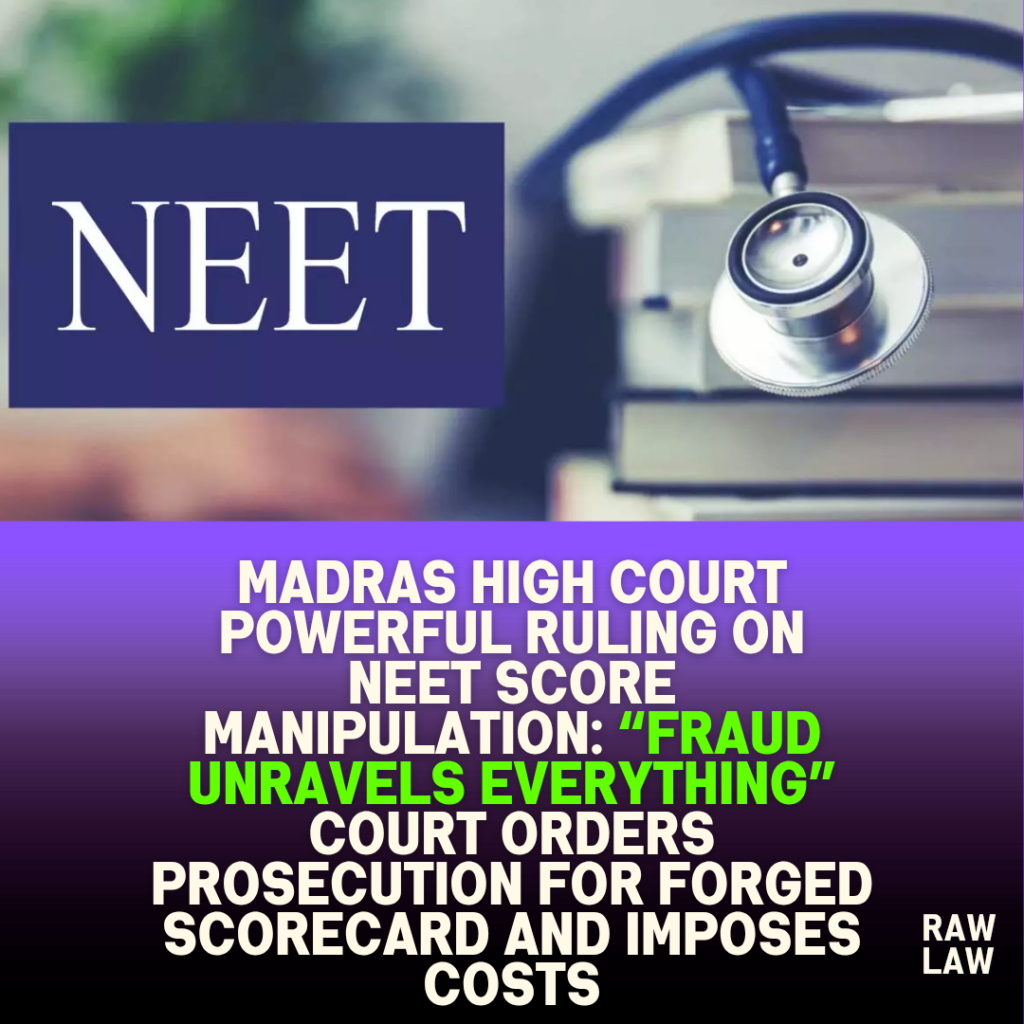Court’s decision
The Madras High Court dismissed the writ petition seeking admission to a medical course based on an allegedly fabricated NEET scorecard. The Court held that the petitioner had produced a forged scorecard claiming 478 marks, whereas the official records revealed a score of 132 marks, with only 49 correct answers and 64 incorrect answers. The Court found deliberate manipulation of the QR code and fabrication of digital documents, warranting criminal prosecution. It not only dismissed the petition with ₹25,000 costs, but also imposed a 3-year bar from appearing in NEET, and directed the authorities to register an FIR for offences involving forgery and fraud.
Facts
The petitioner approached the Court asserting that he had scored 478 marks in NEET and that the National Testing Agency had wrongfully withheld his result. He produced a scorecard and a QR code purporting to show the higher score. However, when the Court directed the NTA to produce the official OMR sheet and scanned records, the agency submitted that the petitioner had actually secured only 132 marks. The NTA explained that the QR code produced by the petitioner did not match the secure QR code generated by the agency. Examination of the OMR sheet revealed mismatches between the official evaluation and the petitioner’s fabricated document.
Issues
The Madras High Court identified multiple issues:
- Whether the petitioner forged or manipulated the NEET scorecard to claim a higher score.
- Whether the QR code relied on by the petitioner was authentic or digitally altered.
- Whether the petitioner was entitled to any relief when the claim was founded on fabricated material.
- Whether the Court should impose penal consequences for attempting to secure admission through fraud.
- Whether criminal prosecution must be initiated for producing fraudulent digital records before a constitutional court.
Petitioner’s arguments
The petitioner argued that he genuinely believed his score was 478 and that the scorecard he produced was downloaded from the official portal. He stated that he had approached cyber experts to retrieve his result and had relied on their assistance, without personal knowledge of any manipulation. He contended that the NTA incorrectly evaluated his OMR sheet or failed to account for errors in the scanning process. The petitioner asserted that he sought only a fair reassessment of his answers and did not intend to mislead the Court. He claimed that the altered QR code was supplied to him and was not his creation.
Respondent’s arguments
The NTA submitted that the QR code in the petitioner’s scorecard was not generated by the agency’s secure system, and forensic verification showed evident tampering. The official OMR sheet produced in sealed cover demonstrated that the petitioner answered only 49 questions correctly and made 64 errors, which mathematically yielded 132 marks. The respondents argued that the petitioner fabricated the higher score to claim admission fraudulently and that such conduct warranted strict action. They emphasised that NEET is a national examination and the integrity of its evaluation process cannot be compromised. The NTA urged the Court to dismiss the petition with exemplary costs and order prosecution.
Analysis of the law
The Madras High Court reiterated that courts cannot grant relief based on fabricated or manipulated documents. Under settled principles, fraud vitiates every legal proceeding, and no equitable relief can be granted where the foundation itself is fraudulent. The Court observed that producing false digital documents before a constitutional court constitutes a serious offence under the Indian Penal Code, Information Technology Act, and Contempt of Court principles. The Court also emphasised that QR codes generated by statutory bodies are cryptographically secure and cannot be substituted with third-party manipulations. The petitioner’s conduct, therefore, attracted legal consequences.
Precedent analysis
The Court relied on authoritative Supreme Court precedents holding that “fraud unravels everything” and that no person can claim benefits based on falsified records. It noted landmark rulings where individuals who forged mark sheets, fabricated certificates, or manipulated public records were denied all relief and subjected to prosecution. The Court also referred to jurisprudence emphasising the sanctity of national-level examinations and the need for absolute integrity in admission processes. These precedents reinforced the Court’s view that tampering with NEET results threatens public confidence in the merit-based system.
Court’s reasoning
The Madras High Court found clear indications of fraud. The petitioner’s QR code did not match the NTA’s secure encryption formats, and the digital signature was absent. The OMR sheet conclusively disproved the petitioner’s claim. The Court noted that even if the petitioner alleged reliance on others, he bore responsibility for producing forged documents before the Court. The Court found that he had attempted to misuse the Court’s jurisdiction to obtain an undeserved medical seat. Observing that such conduct must be dealt with sternly, the Court dismissed the writ petition with costs, declared the petitioner ineligible for NEET for three years, and ordered criminal prosecution.
Conclusion
The Madras High Court dismissed the petition, confirmed that the petitioner had submitted fabricated NEET records, and imposed ₹25,000 costs along with a three-year ban from appearing in NEET. The Court directed the competent authorities to register an FIR under provisions relating to forgery, fraud, and digital manipulation. It reiterated that national examinations must remain beyond manipulation and that courts will not tolerate attempts to abuse judicial processes. The judgment sends a strong message of deterrence and reinforces the integrity of competitive examinations.
Implications
This ruling strengthens the legal framework surrounding exam integrity in India. It establishes that digital tampering of scorecards, QR codes, or OMR sheets will result not only in dismissal of claims but also in prosecution and future disqualification. The judgment is significant for NEET, JEE, and other national-level examinations, ensuring that fraudulent claims do not undermine the merit system. It emphasises that constitutional courts will apply strict scrutiny to forged educational documents and impose severe consequences to protect public trust.



